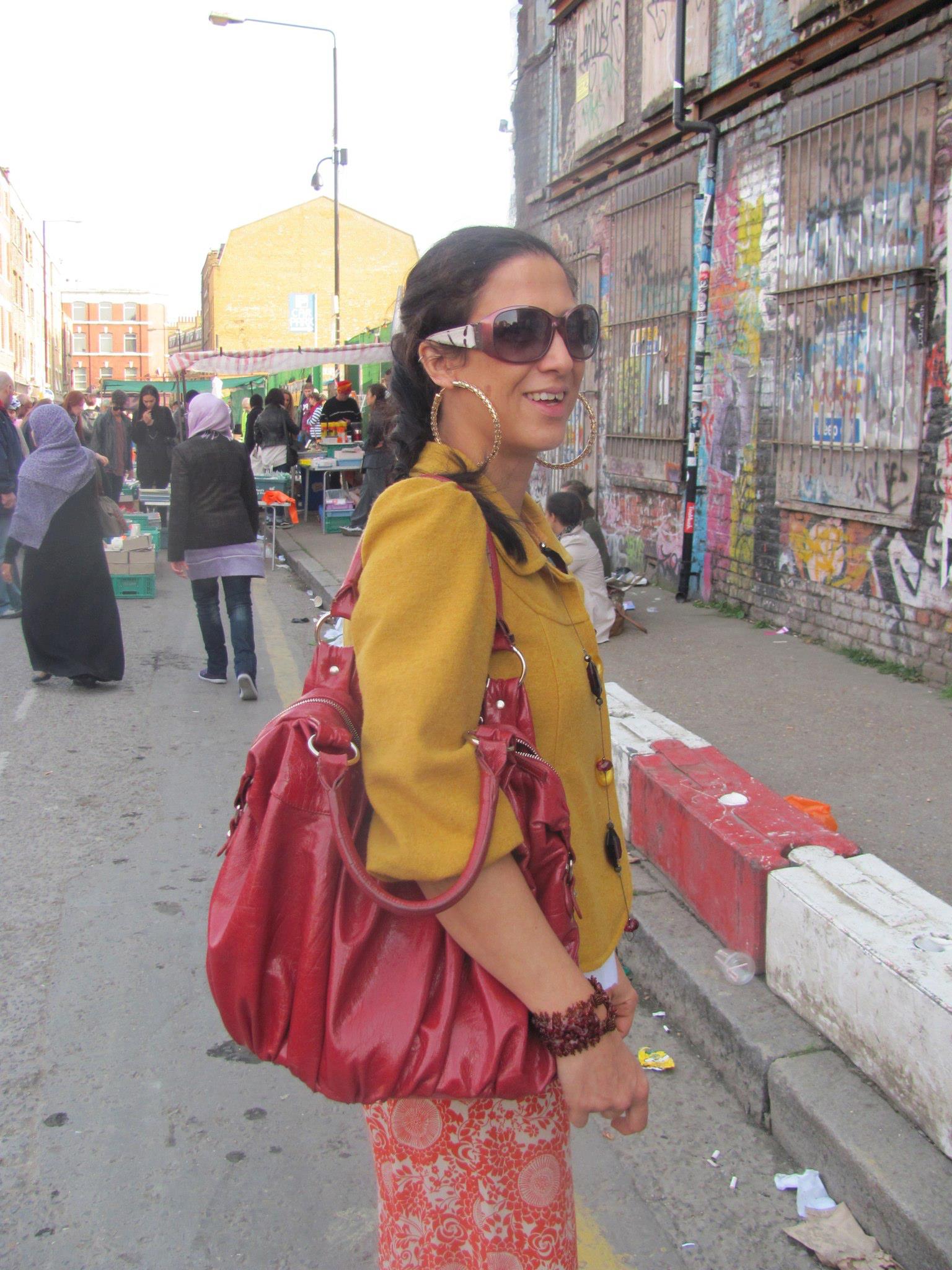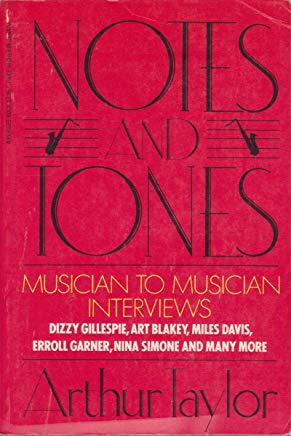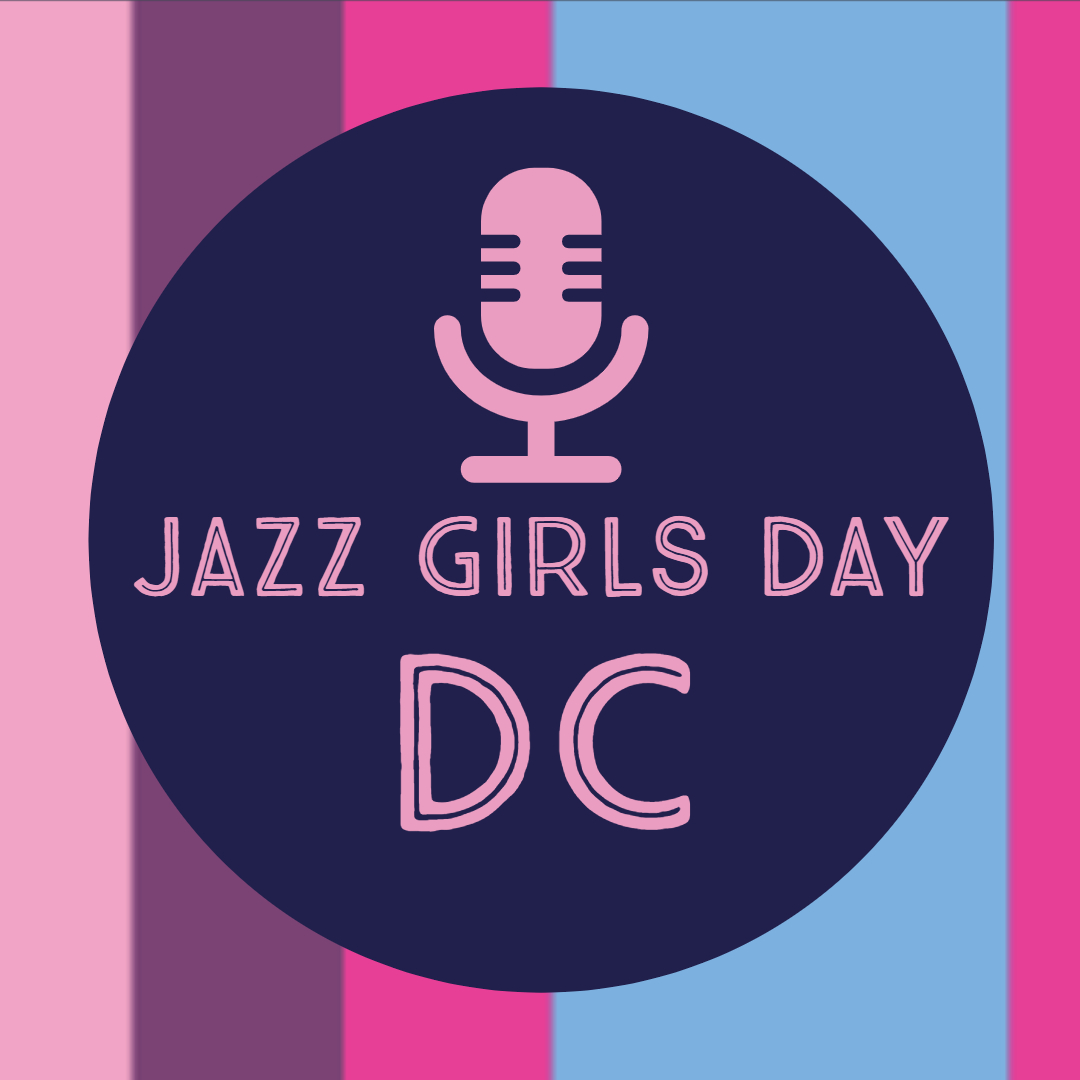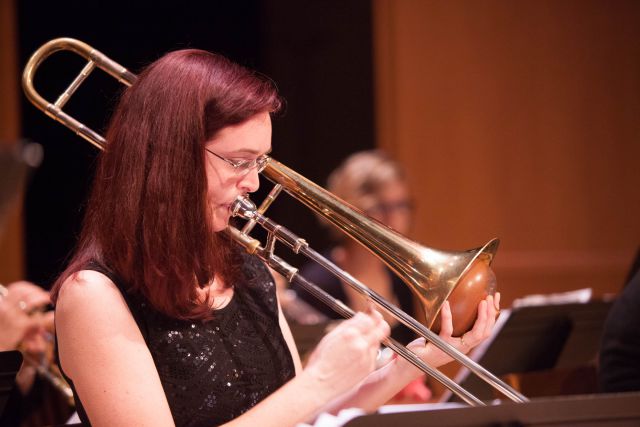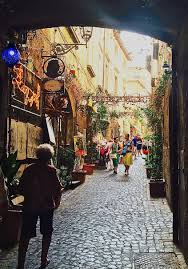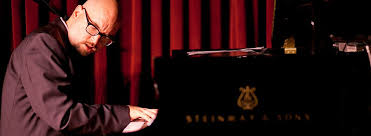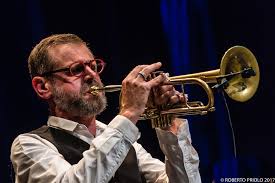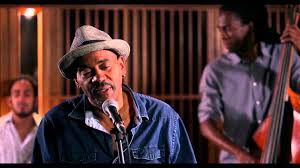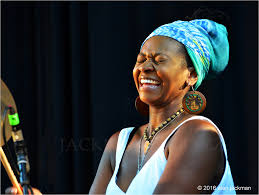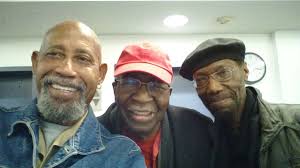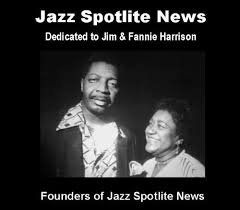Back in 2010/2011 when I was engaged in an oral history interview project for the Weeksville Heritage Center in Brooklyn, accompanied by Weeksville’s resident cultural anthropologist Jennifer Scott (now director of the Jane Addams Hull House Museum in Chicago), and Kaitlyn Greenidge, I conducted a raft of oral history interviews with men and women in the jazz community and beyond. Our territory was Central Brooklyn, specifically the Bedford-Stuyvesant community. [Here it should be noted that among previous interviews from this project published in the Independent Ear were illuminating conversations with the late Dickie Haversham-Bey, proprietor of the legendary Brooklyn jazz club the Blue Cornet, and more recently some of the principles behind the legendary performance/live Blue Note recording session Night of the Cookers, all available in our Archives section.]
For those not familiar with Weeksville, historically it was the first African American settlement in the borough of Brooklyn; some of the historic homes have been preserved on the Weeksville grounds. Among the musicians, arts & social community activists we interviewed for that oral history project, one of the most colorful was Joe Long, proprietor of the classic independent record store Birdel’s. Can you name another community record store whose clientele ranged from Randy Weston and Miles Davis, to Biggie Smalls and Jay Z? Birdel’s was the place. Here’s our conversation with Joe Long.
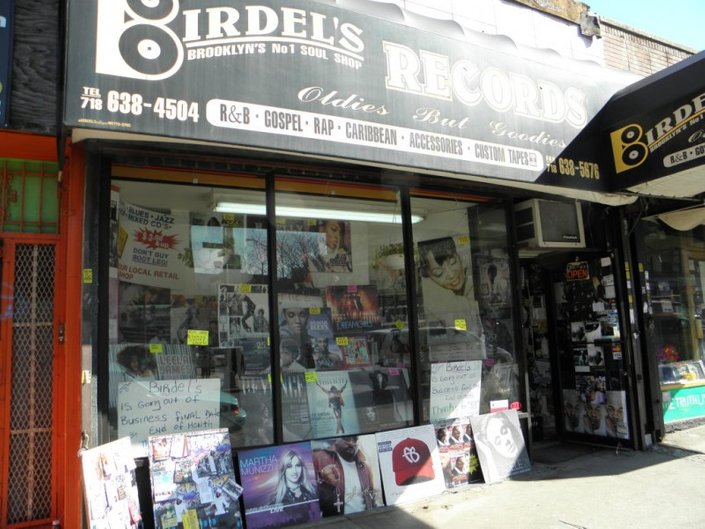
Willard Jenkins: We read about your record store, Birdel’s, in the New York Times.
Joe Long: That was the second piece about our closing.
WJ: When I read that piece it reminded me of record stores I used to frequent as a kid, before there was any Tower Records; the kind of record store in the neighborhood where the records would be behind the counter on the walls. Talk about the history of Birdel’s.
JL: I came to New York from North Carolina in 1954. The reason I came to New York was to better myself with a decent job to help my mother prolong the education of my sister that was in North Carolina College in Durham. She had won a 2-year scholarship, she was valedictorian. I came out of high school at the tender age of 16 and I said I would work to help her to get through her junior and senior year of college. That’s what prompted me to leave North Carolina to come to New York.
In 1954 my sister that lived here worked at Rands Dry Cleaners and she had a position for me when I left North Carolina. I came straight to Brooklyn and we lived on Quincy Street in Bedford-Stuyvesant at that time. I worked at Rands on the line sorting clothes and I learned that quickly, and then I did maintenance [work] with them. I was always an enthusiastic person for music, I really loved music. In my sophomore year at home I bought a Victrola called Airline from Montgomery Ward. Remember those big boxes with AM and FM radio, shortwave and everything? Airline was the brand.
I bought that radio so we would have music in the house and in the community. Victrola, they called them at that time, cost me close to $200 and I paid down like $25 then $5 a week until I was able to pay for it; back then they wouldn’t give it to you until you finished paying for it.
Everybody would come to my house and we would party on the weekends because I had the only Victrola in the community. I was working at the 5 & 10 cent store H.H. Kress, and by me working there I had access to the music – it was 78s during those days and I would bring home these 78s and we would have our little thing. My father was a janitor and after his [work] day finished they would always give us the popcorn and we would distribute it in the community… the cookies and things… So we used to have a good time.
When I came to Rand Dry Cleaners, they had 155 stores across the metropolitan area – Brooklyn, Long Island, Queens, and Staten Island. I would always come down to Birdel’s and buy my music. During that time they were located on Fulton and Throop next to the Apollo Theatre; we had an Apollo Theatre here in Brooklyn too that had acts and music and things. During those days I would come in evenings after work and buy music. Birdel’s relocated down on Fulton & Nostrand.
During those days – this was in 1956-57 – the groups were making records and the entertainers that were a part of those groups would come by the store. The bass singer from the Heartbeats, Wally Roker, we became close. Wally used to say to me “Joe you know music, why don’t you ask Birdel for a job.” I would tell him I already have a job, why do I need another job? During those days the record stores were open until midnight. You had the junkies out there and the drugs and all, but it wasn’t like today, you could feel more safe.
We had the Bickfords during those days, something like Chock Full ‘o’ Nuts [coffee shop]… We had a Bickfords two doors down from Birdel’s on Fulton Street and I used to go down there. Wally would say come on down there and we would talk and he would say ‘I’m gonna tell Birdel to hire you and maybe you’ll like it…’ I said ‘well ok, I’ll give it a try.’ So I spoke with Benjamin Steiner, the owner, and his wife was named Birdie Steiner and they had a guy named Lefty and another fella named Shorty that used to work full time. So I would come in the evenings, and I started to work there and I liked it.
So then I went to Rand after two years and I tell them I’m gonna quit. They didn’t want me to quit because I had learned all the locations of the stores throughout Brooklyn, Queens, Long Island and Staten Island, so they really needed someone with the trucks to help get around. So I told them I’ll give you a coupla weeks notice and then I’m going to leave you, and then I told Birdel’s that I would come with him full-time. I really liked the [Birdel’s] job. I worked part-time at Birdel’s in the evening and that gave me an idea of whether I would want to get into the music business. I liked it so much I told him I would work with him and I would give him ten years; I’m a young man, I said I’ll give you ten years.
He was talking about retiring so I said if you don’t want to sell me the store in ten years I’ll go ahead and get my own business. So he says ‘ok, we’ll see.’ I worked with him and I really liked it. He saw the head I had on me… during those days you bought records by numbers. Once I saw a number I was just like a computer, the number would stick. Right now I can call off numbers from 1954-55 on record labels that we ordered by, and he liked that.
So he would say to me ‘you’re gonna get this store, I’m gonna sell you this store…’ In 1963 I told him I was ready [to buy the store]. In ’64 blacks at that time were a little more on the edge of wanting to do things for self; you had the Black Panther party, the radical Brooklyn guys that really would do things to get attention. God rest Sonny Carson’s soul, he was one of the guys that really was out front. So Birdel’s got a little leery during that time and he was saying that he might have to sell before.
So when the time came and Martin Luther King got killed and the riots came, that really was the icing on the cake; he said I’m gonna sell and get out. During those days SBA small business loan was loaning minority people money and it wasn’t that you had to have a good foundation or background or good bankroll… if they saw the potential in you and you were able to take the business they didn’t mind loaning. That was one of the reasons I was able to get a loan for the business. Birdel had quoted me a price and I went to SBA and they offered me the money so quickly that when I went back and told [Birdel] I had the money that’s when he wanted to up the price $10,000.
I told him ‘Ben you promised me the store and you promised me a price. I worked for you over ten years and never stole a penny from you because my mother didn’t raise no thieves in North Carolina, and I’ve been honest. I had a tendency of working with fellas that would always be stealing and I used to tell them ‘man, you don’t steal the man’s money because one day you might need the man for reference, but if he fires you for stealing you won’t get good references.’ So I said I’m gonna tell you to quit stealing and if you don’t stop stealing I’m going to the boss because I don’t want to work around thieves and I don’t want him to think that I’m part of what you’re doing.’
So at that time he says to me ‘ok I’ll talk to my wife and see if we want to stick to the original price.’ The drugs are flourishing in Bedford-Stuyvesant, especially on Fulton Street and there was a guy who had a store on Fulton Street who was dealing drugs and he wanted the location on Nostrand Avenue and he was the one who offered [Steiner] the $10,000 more than I would pay – because I knew what he wanted to do.
I told Ben, you go home and talk to Birdie because I’ve worked with you you all these years and I’m not looking to just walk away; I put my blood, sweat and tears here and if you don’t sell me this store I’m gonna burn it down. Its just that simple, I said I’ll burn it down, you won’t have it and I won’t have it, you’ll get the little money from your insurance or whatever, but I will burn it down. He went back and talked to his wife; he knew that I was serious. He knew that I wasn’t playing.
During those days I had two fellas – a guy named Mitch and a guy named Jeff, we had a little social club together. I told them once I buy the store I’ll bring you all in. During those days when black folks were on the other side of Fulton Street you didn’t have the idea of coming across Atlantic Avenue to say that you wanted to be a part of Crown Heights.
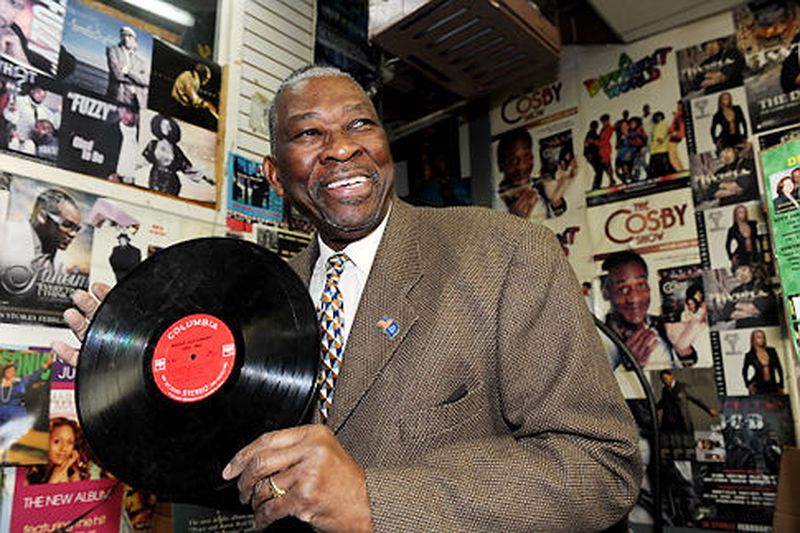
After he went back and talked to his wife they finally made the deal to sell me the business. When I took on Mitch I said my whole vision was to have a chain of independent retail [record] stores. One of the reasons I saw that change I knew that during those days music was popular with the blacks and you had good radio stations that played this music and it wasn’t a thing of wherein you were selling tickets for different programs – gospel programs… all these programs were a help to build Birdel’s up. So when I finally bought the store and we closed the deal, Birdel said to me ‘Joe, you’ll make a lot of money here.’ I said to him ‘Ben, I might not make no money because you made the money, I worked for you and I know you made good money and when we as a race of people find out that one of us own it they tend to not purchase and support like they should.’ I told him that but I wasn’t worried about survival out here because I knew what it took to survive.
When I took on Mitch I said ‘Mitch I want to do a chain and we got as far as three stores. The only people that were competitive to independent [record] retail at that time was E.J. Corvettes, Mays Department store, and Sam Goodies; but Goodies was a part of the record clan that could sell records out of town, so they could sell [at] list prices, they didn’t have to give you a discount.
So as I would build up a store I would put my partner Mitch in there and he had a head and wanted to be Mr. Big Stuff and he didn’t want to work and every time he would go out and hang out, I’d put the workers to work and he’s gone. I told him ‘we can’t achieve a good business if you’re not there, because these people we’re putting in here are gonna be stealing.’ I knew they weren’t gonna take it all, but at least give me the majority, don’t take 60/40 – give me 70/30 or 80/20, but they weren’t doing that so I kept him on, I told him I would give him five years to learn the business, but I kept him on another three years and he still didn’t learn the business.
So then I sat down with him and I said ‘look, we’re gonna have to [end] our partnership. He didn’t want to give it up because now he didn’t have nowhere to go. We had three stores so I told him, I’ll keep Birdel’s on Nostrand Avenue, I’ll give you the tape center on Fulton Street, and we had another store on Flatbush and Prospect, and I said we’ll sell that to my brothers, because I had two brothers working here. That way we’ll all have a store, you can do what you want and I’ll do what I want. But if you want to keep the Birdel’s name for the Birdel’s Tape Center you’ll have to pay me because the name was incorporated, and I told my brothers the same.
My brothers didn’t want to give up their jobs; one worked for the transit authority, the other one worked for an insurance company. They didn’t want to quit their jobs and they put their wives in there to run [the store] and I knew it was gonna be a failure. Women have come a long way from those days, but during that time I could see they weren’t the people to have in your business to carry the load – and I’m being honest, this is what I saw. They hung on for about 3 years and I said [to his brothers] ‘if you don’t want to give up your jobs I’m gonna have to take the store back. If you don’t want to give up your jobs I’ll sell it.’ Eventually I took it back.
I was trying to let Mitch know that I carried him for eight years – I promised you five – and now I want out. I’m divorced now, but during that time my wife said to me to get rid of him and pay him, so I paid him. When I finished paying him [his store] lasted about a year then he went out [of business]. We had a rider in the contract that said if he was to go out, he head to come back to me and see if I wanted to buy the business back. He didn’t do that, but it was alright with me.
Right then and there I started building Birdel’s internationally because I knew the Japanese clientele liked vinyl, people from Germany liked vinyl, and all these people were tourists that would be coming into New York. Harlem was a little more well-known than Bedford-Stuyvesant and they would go up to Harlem – they had the Record Shack, Bobby Robinson with Bobby’s Happy House, and then Rainbow; we all worked together, we were like a network. So when they would come up to Harlem they would tell [record tourists] ‘you need to go over to Birdel’s in Brooklyn.’ And all you had to do is get one [tourist] to see what you do and what you had, and it became like wildfire and [tourists] started to come into Brooklyn. And then we became internationally known because the Japanese would come and they would tell somebody, and England would tell somebody… and they’d say ‘go to Birdel’s’, they forgot about Harlem [laughs].
That’s how I became really popular. It took years to do this, it didn’t happen overnight because vinyl took a decline; when I came into the business it was vinyl, then it became mono/stereo with records and stereo was an elevation of the sound that was better, then it was 8-tracks, then cassettes. All of these trends I grew up in with the different modifications in the music business.
All of that modification with vinyl (mono-stereo), the record manufacturers felt as though now there was a decline in the music as vinyl. They would put out a vinyl album and they would tell the public that it was going gold. During that time gold was if you sold 10,000 units; 100,000 units would be platinum. They weren’t really selling that amount because it was all a number game; they would ship the amount to these stores and in essence if they didn’t sell them they would get them back in return.
So we had a cutout house in Philadelphia that I would go to and buy this product on vinyl. I could buy that same album for $1 from the cutout house and I could in turn sell it for $1.98 or $2.98 – most of the time I would put $2.98 on it – and this is how I built it up, because now the record is only 6 months or a year old and people still want it. So that’s how I started building up the vinyl trade, and this is how the word got around to go to Birdel’s, get the music in vinyl because one thing about it was if I didn’t have it, nobody had it because I would order for people all over… You have to build a customer relationship and it wasn’t about the money with me, it was about the commitment that I had to my customers. Our motto would be “if Birdel’s don’t have it, ain’t nobody got it…’ They would depend on me because I was like their bible. But it took a lot of work.
When we would have those big conferences, like Jack The Rapper, and the Urban Network, I would go because we got record companies to support us and the independent stores were always the foundation of the record business. If we didn’t build the music during those days – when you had the disc jockeys… before Frankie Crocker you had Eddie O’Jay, you had the Jack Walkers, WLIB, WNJR in Newark, Jocko… These guys were disc jockeys, they made the music… That was before the Frankie Crockers came along and the Gary Byrds… [Deejays] would make the music and we would have them, wherein the big boys wouldn’t carry it because they didn’t know nothin’ about it. They [big chains] would only carry it after we broke the record, so the manufacturers and these companies knew that the independent store was the foundation of the business to build it up, so they had to support us.
We had corporations together; we had Mirror, independent stores coalitions throughout the country and we would meet at these conventions and we would voice our choice. So then they said ‘we gotta do something else now’ and they came up with digital tapes and that was taking away from cassettes, so then they said they had to come up with another configuration, which brought in the CD. They didn’t know that the CD would really be a thorn in their side to the music business. Because what happened was everybody that had a CD could copy it. At these big conferences when the presidents of all these companies would come in they would always call me the troublemaker because I would always be on their ass. You couldn’t butter me up… a lot of these presidents of these coalitions would come in and say I’ll take care of you, but you don’t have to take care of your group. But they couldn’t say that to me, I would say to them ‘you know what, if you all continue to make CDs and worry about bootlegs and get the RIAA and the FBI to work with you to combat this you all will have to quit making the [CD burner] machines. Now if you’re making the machine and these people are buying the machine, what did you expect them to do? This was one of the downfalls – the copying of product.
Then they tried to put labels about $10,000 fines for CD burning… people didn’t pay that no mind and it became widespread. I told them when you come to us about a bootleg we are only the ones who can sell it, you’ve gotta hit the manufacturers where these people are making 100,000 units at a time. So they busted a couple of them – one in Philadelphia, one in Florida and they took 100,000 records, but that didn’t stop it.
One day we were talking at one of those meetings, I said ‘you know what, ya’ll let the horse out of the barn now and you’re trying to get him back in. You have destroyed independent music labels because now everything is geared to the big boys, the artists are going along with them now. You’ve got Burger King, McDonalds and all these companies telling these artists we can give you X amount of dollars and we will book you about ten cities and you’ll be able to make more money, so that cut out the independent.
Then the same thing when the radio stations combined; they got rid of all the little radio stations and they made a big network, and KISS went all over the country and bought up all these stations – forgot about the independent disc jockeys they had, brought in artists that don’t know nothing about the record business and they put them in position that they shouldn’t have been, and the disc jockey that went to school to learn the business was no longer a part of that. Through it all [Birdel’s was] were surviving and they couldn’t understand it. They used to tell me all the time, ‘you know, you don’t ask for nothin’, how you makin’ it’? I said ‘with the master upstairs’, I used to quote scriptures on them in a minute. As long as I’ve got my health, got my strength, I’m gonna make a dollar – and this is what I’d tell them all the time. All of this time that we worked as a coalition to build the [record] manufacturers up, they were always looking to tear us down.
Then they began to like me and they started doing things for me all the time. I was reading an article from 1973 that Nelson George wrote for Billboard; I knew his mother, his mother’s best friend was one of my bookkeepers. I watched Nelson grow up and every time he’d write an article he’d mention Birdel’s.
WJ: You mentioned that you sold tickets to events…
JL: We sold tickets for events all over the metropolitan area – New York, New Jersey… we were like a ticket outlet. Before Ticketron first started this is what we were doing. When Ticketron came I wanted to be a Ticketron outlet. I bought a building on Nostrand Avenue – the old Chase Manhattan building and I got an architect to come in and do a layout for me; I wanted to do three levels, something like Tower Records was on Broadway, a 3-level [record store] with Ticketron. When he laid out the plan for me it would cost close to a million dollars to do the construction and everything. I went to Freedom Bank, I went to Carver’s Bank, Citi Bank… and all of these banks refused to loan me money. It really deterred me about elevating my game because now I can’t get no backing.
They would always say to me ‘what is your equity’ and all of that. I said ‘hell, if I had something I wouldn’t be here! If I’ve got $300,000 I don’t need you! I’m here to borrow money and if I fail you’ve got whatever it is…’ but they couldn’t see it. It was the same thing in 1978; I could have bought that corner on Fulton Street where I was with [Birdel’s] and I couldn’t get no money. When you talk about politics, political people and how they help the independent, grassroots people… it ain’t there. They might talk about it but believe me its not there. I should have been bigger than J&R; I knew those people, Jimmy & Rachel, those are the people that own J&R, I knew those two little people when they were nobody. Nobody came to bat for us, and that is the saddest part. Now that corner on Nostrand Avenue & Fulton Street you can’t buy that for $3M, guy is asking for $10M for that corner now.
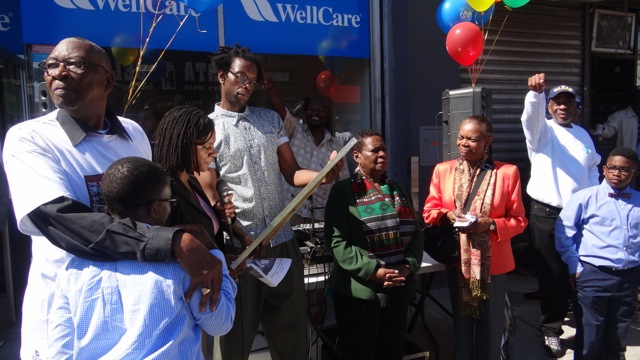
ON THE DAY IN 2014 WHEN A STRETCH OF NOSTRAND AVENUE WAS NAMED IN HONOR OF BIRDEL’S
WJ: Did you have other people working for you who went on to have their own record stores?
JL: Yep, a couple of them. Not only record stores, I’ve had others come in and learn the record business who went on to be producers. As a matter of fact Biggie [Smalls] I started him, he used to come to my store on Nostrand Avenue and go downstairs… When he first started coming around he used to say ‘Birdel, I hear you got a lotta old 45s and stuff in the basement. Me and my man wanna go down and listen’ – I never knew his man’s name. I said ‘oh man, come on down.’ He used to tell me ‘one day I’m gonna be big and when I’m big I ain’t gonna forget you.’ I said ‘OK Biggie, you ain’t gotta do nothin’ but what you’re doing now… smokin’ reefer out there on the block shootin’ craps, hanging out there at the pool room up at Cambridge Place… that’s all you gonna be…’
He’d say ‘naw, I’m gonna be better…’ I said OK. And when he got big he came back and said ‘whenever you want me to an autograph session [in-store] I’ll do it, let me know.’ At that time the West coast and the East coast [rappers] had that fightin’ thing goin’ on. He came and did that autograph session about two weeks before they were going out to Los Angeles. He and Puffy wasn’t the best [of friends], it was like a front thing… I told him ‘Biggie if I were you I’d stay home…’ He said ‘naw Birdel, I gotta go out there…’ I said ‘let Puffy, he’s the owner of the company, let him go out there and see what’s happening.’ But he went out there and never came back, until he came back in a box.
WJ: Did you have any other young people like that come around the store?
JL: Jay-Z used to come through there, all these guys… Reverend Run, Russell Simmons and all of those young guys used to come through there. Jay-Z or one of those guys off of Morris Avenue came through one time and he was in the store and we wanted to do an autograph session and every minute he’s looking behind his back. I used to tell him ‘what’s wrong man, I don’t have people in here to be scared of, if there’s something you’ve done you better go around there and clean it up, ‘cause you’re out here in the limelight.’ What’s that other boy’s name… Rob Base… These are the kind of guys that I would help. I’ve always been a person that regardless of who you are or what you were doing, I would always try to set you straight.
WJ: What kind of help would you give these guys?
JL: I’d help them financially, mostly with the knowledge and understanding; I fed their hunger, and I talked to them… I used to have little sessions [in Birdel’s], bring the drug guys off the street, and set ‘em down in there on Nostrand Avenue… I’ve had a lot of them come back later in life and say to me, say to the children, ‘you see Birdel’s over there, if it wasn’t for him you wouldn’t be here, he straightened my life out.’ These are the things that I really enjoy because I’ve given so much and I guess that’s why I’ve been blessed like this.
When I said I was going to close that store after 50 years I knew I had done a job. I got support all over the world, not just New York and the States… I got a call from Ghana – and I was in Ghana, sent ‘em product… we took on a family there, me and my sisters. We had a Long Foundation that we helped to support the needy over [in Ghana], we helped put computers in a school over there… So these are the things that I’ve done, but when I do something I don’t need my name in the spotlight because I do it from my heart.
WJ: Do you remember having jazz guys come into your store?
JL: Oh yeah… Cecil Payne, Wilbur Ware, Randy Weston, Paul Chambers, Miles Davis…
WJ: And what would they come in for?
JL: To ask me about music, ask me did I have certain music. The jazz musicians always bought each other’s music during those days so that they could keep up with what was going on. The Blue Coronet was the jazz club down the street before Brownie’s Hideaway around the corner… These were places that the jazz musicians hung out in and played. They had a big place on Franklin Avenue near St. John’s that had played jazz… Randy Weston and all of them guys used to come through and they could play. During those days when they were appearing at the Blue Coronet they would walk up to the store because during those days we were open until 12:00 midnight.
WJ: Did you play music out into the street?
JL: Yes, that was a big help; I had speakers set up on the street.
WJ: You just mentioned a place I’m not familiar with, Brownie’s Hideaway; talk about that place.
JL: Brownie’s Hideaway was a little nightclub spot on St. Marks right off of Nostrand, right where Key Food is now.
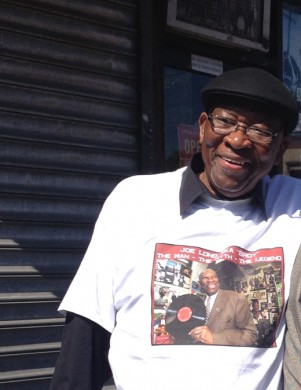
WJ: What happened there?
JL: It was like a little spot that the entertainers came in and sang, local talent would come in and sing. Across the street they had The Cove at 704 Nostrand Avenue, then you could go down to Town Hill on Eastern Parkway.
WJ: So I guess you knew Dickie Habersham-Bey from the Blue Coronet?
JL: Yeah, Dickie I knew for years.
WJ: Did you sell tickets at Birdel’s for jazz events?
JL: Any event we sold tickets for – jazz, gospel, R&B, oldies but goodies… all of those things we sold.
WJ: So the jazz guys would come in and buy each other’s records?
JL: Yeah, they listened and if they liked it they would buy it… They supported each other.
WJ: Back in the day the classic record stores would always enable the consumer to come in and listen to something they were interested in. What kind of set-up did you have at Birdel’s for customer listening?
JL: I would play it for them. Most of the time I could look at you and see if you REALLY wanted to buy it, or you just want to hear it. Most of the time the [record] companies would give us a promotional copy [of new releases] so we would have a copy, but not all of the companies. But what I would let you know up front is I’m gonna open this for you, but if you really want to buy it I don’t mind playing it for you. If you don’t want to buy it then I’ll have to seal it back up – I had a sealer – and then I’ll sell it to the next customer.
Most of the time during those days you would always have a 45 or something that came from that album, so we would play the 45 and you didn’t have to worry about the album. During those days, when an artist made a good record they made a good album, it wasn’t about one good tune and you thought about the rest of it being garbage. Ninety percent of all of those records were good albums during that day.
WJ: Did you have a regular policy of artists making personal appearances in your store?
JL: Uh huh, if they were someone in the vicinity I would have them come in there. Jazz artists were funny they didn’t stay like the blues artists or the R&B artists. They would come through there and people would walk in the store and I might say ‘here’s Wilbur Ware over here, a bass player, he played with Miles Davis, or he played with Randy Weston or somebody…’ And they’d say ‘oh yeah…’, and then Wilbur would say [quietly] ‘…I play music, I don’t want to be out there…’ that’s the way they would talk. I’d say ‘man, you’re an artist, let the people know who you are!’
WJ: So jazz artists were too modest?
JL: Yeah they were too modest. But a guy like Miles Davis would come in there and [the customers] knew Miles right away. He would come in there and stay for awhile and say ‘….hey what’s goin’ on, I’m down at the Blue Coronet for awhile, come on down and listen to me – I’ll play something you want to hear…’ I’ve always been a jazz lover.
WJ: Why did you decide to close Birdel’s?
JL: In 1968 when I took over the store I said I would do 25-30 years because I was looking for a change, and I wasn’t gonna look to work the rest of my life, I wanted to be behind a desk calling the shots. When 2007 came I said ‘wow, this is my 50th year in the business and I’ll be 70 years old…’ Maybe we’ll do a 50/70 [anniversary celebration]. So I called up the record companies and I told them I wanted to do a 50/70. They said ‘what do you mean by that Joe?’ I said I want to get a boat and travel around Manhattan and I want all my friends from all these years that I’ve known, not only in the music business – my church family… I want everybody under the same roof and I want to give a 50/70 gala.’
They said ‘we can help you, but we don’t know how much.’ I said, well I’ll get a price for a boat and we’ll go from there. So I got a price for the boat – now they have downsized these record companies so you only have four big ones – Universal, BMG, EMI and another… it’s only four big boys now – and they all came together and said they would give me a piece of money and that’s what I did.
That was the year, 2007, that I was gonna retire. The reason I wanted to retire then is because I could see the vision of the record industry shrinking as far as music is concerned, and especially with the downloads; I fought them too for 10-15 years when they started selling [downloads] and you could put it on your iPod or whatever. I saw then the decline of people coming into your store. If I wanted to stay in this business I would have changed this whole business around.
I brought my nephew into the business to carry on Birdel’s when he finished school at North Carolina Central because he was majoring in business administration. And he learned the business and he worked with me ten years. After that I was ready to move out. But then he met a young lady and she didn’t want him in the record business no more because of the climate you’re surrounded by in the record business – all the entertainers, all the parties… She saw if she didn’t get him out of the business she might have lost him and she really wanted to get married. So she told him she would like to marry him but he would have to come out of the business.
He really didn’t tell me at the time that he wanted to get out of the business. Later on he said that he wanted to get married and Tonya wanted to move to North Carolina and wanted to go back to teaching. So my son is a playwright, my daughter is a doctor – OBGYN – so I said to myself ‘why am I gonna continue to work? I’m set, I have my health and strength, so I wanted to do a few things before I leave this earth – I want to do some traveling, go back to West Africa, and I want to do some other things that I have in mind, so I said maybe with the record business declining like it is now it’s a good time for me to get out.
My customer base didn’t want me to leave, so I hung on for another 3 years and I saw that I wasn’t making no money, all I was doing was paying rent, buying music, and there wasn’t any sense in putting good money to bad money, so I said no use in me keeping my money in here just to satisfy a few devoted customers, because the [customer] age from 16-40 nobody was buying, they were all online. So if you don’t have that customer base there’s no use in continuing. If I had stayed I would have turned the store around to electronics and just had the music for an offset.
I would have kept the gospel and the oldies because that’s what I was noted for; my specialty was oldies. They really didn’t think I was gonna close. I used to say ‘ya’ll gonna miss me when I’m gone…’ They would say ‘… you ain’t going nowhere…’ I’d say ‘watch me…’ One of the guys came in crying, he said ‘Birdel, you told me 3 years ago… I’m gonna miss you when you’re gone…’ They came to the realization that I’m going to close these doors.
WJ: What did you do with all your record stock?
JL: I’ve got stock in storage… the vinyl. I’ve got maybe 50-60,000 pieces of vinyl. I want to sell the whole thing, I don’t want to sell it piecemeal. I had a guy from Ireland that wanted it all but he ran into a problem with the freight and how he would get it back, he didn’t want to spend a lot of money to get it back [to Ireland]. I had another guy from Germany who told me if I took this stock over there I’d be a millionaire overnight with this vinyl. He said they were hungry, they needed this because nobody else has it. I told him ‘man, I’ve been doing this 53 years and I’m tired, let me do what I want to do…’
WJ: As you look back on those 53 years, what thoughts do you have about the music business? There are two different things we’re talking about here – the record business and the music business.
JL: The music business – over those 53 years I’ve been involved in it, the record business has been good to me. The record business has taken a decline. The music business will always live because you have a history here with the music that cannot be duplicated no more. They can sample it they can do whatever they want, but they can’t take away from the originals. This is why music is so important today. What has really hurt the music business part of it is you don’t have radio that is dedicated to play music because now everything is about the dollar. During those early days we as independents could buy time; you could buy a half hour or 15 minutes on a station and play in those 15 minutes what you wanted to play.
Only on WBGO [in the metro area] can you hear good jazz, the same with the oldies but goodies. What I really wanted to do was to buy a radio station. I used to tell people that if you bought a station you don’t worry about the ratings and you don’t worry about the listeners because if you play good music you’ll get listeners.
WJ: I can remember when I was a kid there was a guy in Cleveland who had a record store and he bought up a few hours on the air on WJMO, the black station, and he’d have his thing every Sunday (the “Pleaser” show). Did you ever do that?
JL: I did a little bit years ago. I went to school for radio and worked at WPNN down in Annapolis, MD for a year or two, but I came back to New York. I found that during those days the disc jockey had the freedom, but you didn’t have the support of the owners because they were looking for the dollar, and you’re on staff so you’ve gotta do what they tell you to [play]. The big corporations came in and bought the stations and then they collaborated and put them all together, so then they were in control.
So if you hear this [record] in Atlanta, you’re gonna hear it in Milwaukee, in New York, hear it all over. This is the way they program music now and they don’t play good music. When have you heard a good jazz record on the radio going back to a Miles Davis “Bag’s Groove,” 1957-58? They don’t have that today, so you really have the music that’s there but its not getting the exposure, it’s not getting the airplay.
